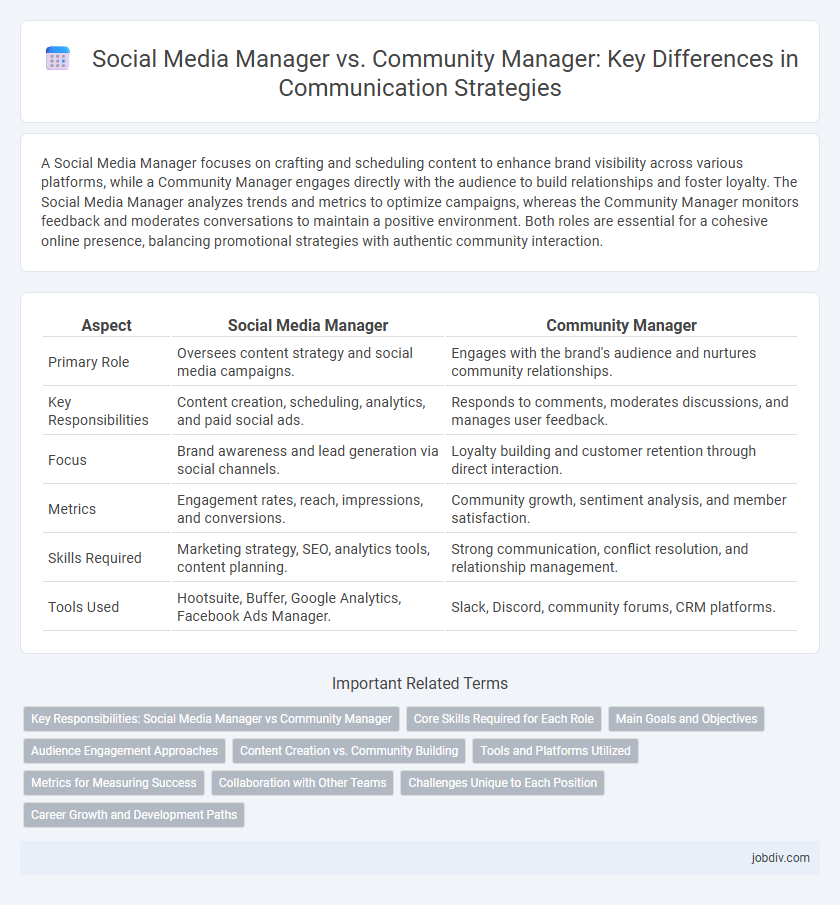A Social Media Manager focuses on crafting and scheduling content to enhance brand visibility across various platforms, while a Community Manager engages directly with the audience to build relationships and foster loyalty. The Social Media Manager analyzes trends and metrics to optimize campaigns, whereas the Community Manager monitors feedback and moderates conversations to maintain a positive environment. Both roles are essential for a cohesive online presence, balancing promotional strategies with authentic community interaction.
Table of Comparison
| Aspect | Social Media Manager | Community Manager |
|---|---|---|
| Primary Role | Oversees content strategy and social media campaigns. | Engages with the brand's audience and nurtures community relationships. |
| Key Responsibilities | Content creation, scheduling, analytics, and paid social ads. | Responds to comments, moderates discussions, and manages user feedback. |
| Focus | Brand awareness and lead generation via social channels. | Loyalty building and customer retention through direct interaction. |
| Metrics | Engagement rates, reach, impressions, and conversions. | Community growth, sentiment analysis, and member satisfaction. |
| Skills Required | Marketing strategy, SEO, analytics tools, content planning. | Strong communication, conflict resolution, and relationship management. |
| Tools Used | Hootsuite, Buffer, Google Analytics, Facebook Ads Manager. | Slack, Discord, community forums, CRM platforms. |
Key Responsibilities: Social Media Manager vs Community Manager
Social Media Managers strategize and execute content across multiple platforms, analyzing engagement metrics to optimize brand visibility and drive targeted audience growth. Community Managers engage directly with users, fostering a loyal community by moderating conversations, responding to feedback, and cultivating brand advocacy through personalized interaction. Both roles require strong communication skills but differ in scope: Social Media Managers focus on content creation and platform performance, while Community Managers prioritize relationship building and community engagement.
Core Skills Required for Each Role
A Social Media Manager requires expertise in content creation, analytics, and strategic campaign planning to drive brand awareness and engagement across multiple platforms. In contrast, a Community Manager excels in fostering relationships, moderating user interactions, and managing online discussions to build a loyal, engaged audience. Both roles demand strong communication skills, but the Social Media Manager focuses more on marketing metrics while the Community Manager emphasizes community growth and support.
Main Goals and Objectives
A Social Media Manager focuses on crafting and executing content strategies to increase brand awareness, engagement, and follower growth across platforms like Instagram, Facebook, and Twitter. In contrast, a Community Manager prioritizes building and nurturing authentic connections within online communities, fostering meaningful interactions, and managing user feedback to enhance customer loyalty. Both roles aim to strengthen brand presence but differ in their tactical approach to audience engagement and relationship management.
Audience Engagement Approaches
Social Media Managers optimize content distribution across platforms to maximize reach, utilizing data analytics and paid advertising campaigns to target diverse audience segments effectively. Community Managers prioritize fostering authentic relationships and active dialogue within brand communities by moderating discussions, nurturing user-generated content, and addressing customer feedback promptly. While both roles aim to boost audience engagement, Social Media Managers emphasize broad visibility metrics, and Community Managers focus on deepening loyalty through personalized interactions.
Content Creation vs. Community Building
A Social Media Manager focuses on content creation, crafting engaging posts, graphics, and campaigns to drive brand awareness and attract followers. In contrast, a Community Manager prioritizes community building by fostering relationships, moderating discussions, and responding to audience feedback to nurture loyalty and engagement. Both roles are crucial for a comprehensive social media strategy but emphasize different aspects: content production versus audience interaction.
Tools and Platforms Utilized
Social media managers primarily utilize scheduling tools like Hootsuite, Buffer, and Sprout Social to plan and automate content across platforms such as Instagram, Facebook, Twitter, and LinkedIn. Community managers engage more with platforms like Discord, Reddit, and Facebook Groups, leveraging community management tools such as Tribe, Discourse, and Zendesk to facilitate real-time interaction and moderate discussions. Both roles depend on analytics tools like Google Analytics and Socialbakers to monitor engagement, but community managers prioritize sentiment analysis tools to gauge member feedback and foster loyalty.
Metrics for Measuring Success
Social Media Managers focus on metrics such as engagement rate, follower growth, click-through rates, and conversion rates to gauge campaign effectiveness and audience reach. Community Managers emphasize metrics like sentiment analysis, member retention, response time, and active participation to evaluate the strength and health of an online community. Both roles use data-driven insights but prioritize different KPIs aligned with their specific communication goals.
Collaboration with Other Teams
A Social Media Manager collaborates closely with marketing, sales, and creative teams to align content strategies with brand goals and campaigns. A Community Manager works directly with customer service, product development, and support teams to address user feedback and foster engagement. Both roles emphasize cross-functional collaboration but target different facets of audience interaction and brand communication.
Challenges Unique to Each Position
Social Media Managers face challenges in consistently producing platform-specific content and analyzing diverse engagement metrics across channels like Instagram, Twitter, and LinkedIn. Community Managers navigate the complexities of fostering genuine interactions, moderating discussions, and resolving conflicts within niche online groups or forums. Both roles require tailored strategies to adapt to ever-evolving algorithms and audience expectations while maintaining brand voice and trust.
Career Growth and Development Paths
Social Media Managers often specialize in content strategy, analytics, and brand promotion, leading to career growth in digital marketing and brand management roles. Community Managers focus on building and nurturing online communities, managing engagement and customer relationships, creating pathways toward roles in customer experience and community development. Both roles offer distinct development opportunities with Social Media Managers progressing toward strategic marketing leadership, while Community Managers advance into customer success and engagement strategy positions.
Social Media Manager vs Community Manager Infographic

 jobdiv.com
jobdiv.com